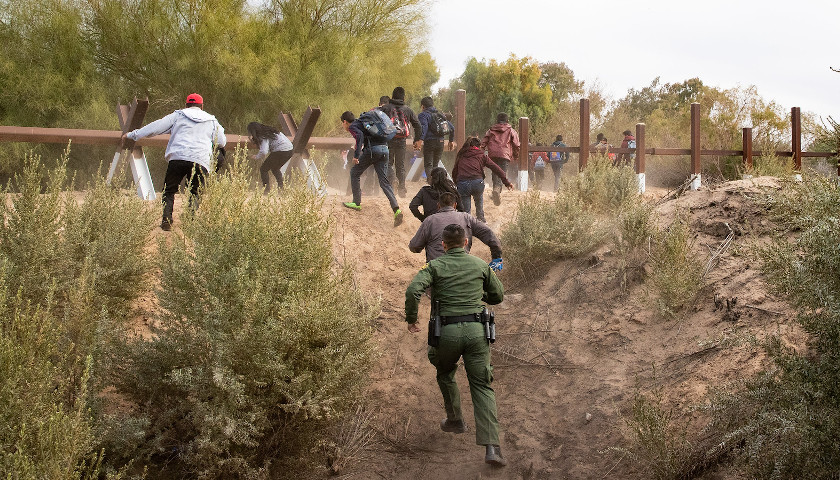By Katabella Roberts
The United States is on track to reach more than 1 million illegal alien encounters so far in the fiscal year 2022, the head of the Border Patrol, Raul Ortiz, said on March 29.
“Probably in the next two or three days we’ll get over a million encounters or apprehensions along the southwest border,” Ortiz said at the Border Security Expo in San Antonio, Texas, Fox News reported.
Signaling that the situation at the border is global in nature, Ortiz said that border agents have encountered illegal aliens from 157 different countries.
In February alone, there were 164,973 encounters—up from 101,099 encounters in 2021 and 36,687 in 2020, according to Customs and Border Protection (CBP) numbers.
The law enforcement agency has also noted a more than 100 percent month-over-month increase in February in two categories of illegal aliens—family units and unaccompanied minors.
February’s numbers mean that there were 838,685 southwest land border encounters since the fiscal year began in October.
March’s numbers have not yet been released but are already expected to surpass February’s, and take the number of encounters for the fiscal year to over 1 million, within just six months of the fiscal year.
Ortiz noted on Tuesday that the Border Patrol is currently understaffed and is facing further challenges due to the ongoing COVID-19 pandemic.

Ortiz’s comments echo those of Rep. Michael McCaul (R-Texas) who issued a similar warning on Sunday as more people try to make their way into the United States in the coming months.
“It’s going to get worse. It’s going to get a lot worse, springtime, summer, more and more come over. The message is coming back that, ‘Hey, we got a new president, come on in, we’re open for business to the traffickers,’” McCaul said in an interview on ABC’s “This Week.”
“I predict a million people trying to get into this country by the summertime,” McCaul said.
President Joe Biden has faced criticism from Republicans over his handling of the border crisis, with many believing the situation has worsened due to the administration’s reversal on immigration policies previously put in place by former President Donald Trump.
The Biden administration is currently weighing up whether or not it will end the controversial pandemic-era Title 42 policy implemented by Trump which allowed Border Patrol agents to turn most illegal aliens back to Mexico immediately if they posed a health threat amid the COVID-19 pandemic.
Soon after Biden took office in 2021, the United States stopped expelling unaccompanied minors, alleging that it was cruel and inhumane to do so.
In mid-March, the Biden administration announced that it will potentially bring changes to the policy because there is no longer a serious transmission danger of COVID-19 in the United States in relation to illegal immigration.
This, in turn, could see an influx of illegal aliens at the border, a prospect that concerns a number of lawmakers, including Sens. Kyrsten Sinema (D-Ariz.) and Mark Kelly (D-Ariz.), who have urged Biden not to end the border restrictions policy without first having a “comprehensive plan” in place.
“We write to you to express great concern about the lack of a specific plan from your Administration with respect to potential changes to the Title 42 Public Health authority, which the [DHS] has relied on at the border during the coronavirus pandemic,” the senators wrote in a March 24 letter (pdf) to Biden.
“Given the impacts that changes to Title 42 could have on border communities, border security, and migrants, we urge your administration not to make any changes to Title 42 implementation until you are completely ready to execute and coordinate a comprehensive plan that ensures a secure, orderly, and humane process at the border,” they said.
Read More From The PatriotAmerican
Biden on March 21 told reporters at the White House that “a lot more” could be done to address the increasing number of illegal aliens crossing the border into the United States.
“We are in the process of doing it now, including making sure we reestablish what existed before—which is they can stay in place and make their case from their home countries,” he said.

